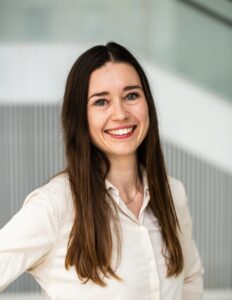
Nicole Bakker is a design engineer and researcher at the intersection of industrial ecology, digital fabrication and data-driven systems design. In her work, she drives solutions for the circular economy, addressing both biological and technical product cycles.
Her graduate thesis research (2024) at MIT is at the intersection of renewable energy and materials circularity—with a specific focus on solar energy. Through a Material Flow Analysis, future waste flows from discarded solar photovoltaic (PV) panels are predicted up until the year 2100. This study combines quantitative modeling with materials characterization and retrospective analysis of solar cells, covering almost a century of technology. Recommendations are made for recycling solar panels today.
With a Fulbright scholarship, Nicole graduated from the Master in Design Engineering at Harvard University in 2018, where she was awarded the Peter Rice Prize for Excellence in Structural Design. She holds an undergraduate degree in structural engineering (with honors). In 2013, Nicole published her first book, titled Photovoltaics in Historical Built Environments—Interactive Design Manual.
Outside of academic work, she is an active member of SundAI Club (Boston’s premier AI hacking club by the Harvard and MIT community), served as a mentor at the MIT MakerWorkshop, co-organized the first two editions of the Global Community Bio Summit, made Clippy, a 12-foot tall AI-themed artwork, and helped build the Living Knitwork pavilion displayed at Burning Man. She is also founder of Circular Engine and co-founder of Circular Statistics, a non-profit initiative.
Education
Massachusetts Institute of Technology
Master of Science, MIT Media Lab
Cambridge, MA
2024
Harvard University
Master in Design Engineering
Graduate School of Design (GSD) and School of Engineering and Applied Sciences (SEAS)
Cambridge, MA
2018
Delft University of Technology
2015 MSc course: Sustainable Innovation in Practice (D-Exto)
2013 MSc course: Smart & Bioclimatic Design
Delft, The Netherlands
NHL Stenden University of Applied Sciences
BSc Architecture and Construction Engineering, major Structural Engineering (with honors)
Leeuwarden, The Netherlands
2015
Publications
View publications on my Google Scholar profile.
Academic Papers
Read, J.R., Seppala, J.E., Tourlomousis, F., Warren, J.A., Bakker, N., Gershenfeld, N. Online Measurement for Parameter Discovery in Fused Filament Fabrication. Integr Mater Manuf Innov 13, 541–554 (2024).
Bittner, N., Bakker, N. Circular economy and the hospitality industry: A comparison of the Netherlands and Indonesia. Journal of Cleaner Production. Volume 444, 10 March 2024, 141253 (2024)
Kong, D.S. and Bakker, N. Community driven design of living technologies. In Proceedings of the 15th Participatory Design Conference (PDC ’18). Association for Computing Machinery, New York, NY, USA, Article 47, 1–3. (2018)
Books
Bakker, N. Photovoltaics in Historical Built Environments – Interactive Design Manual, NHL University of Applied Sciences, Leeuwarden (2013). ISBN: 978-94-91790-03-4
Technical contributions
2015 “Het Zodenhuis van Firdgum. Middeleeuwse boerderijbouw in het Friese kustgebied tussen 400 en 1300” – Daniël Postma. Rijksuniversiteit Groningen, Groninger Instituut voor Archeologie. ISBN: 978-90-367-8280-7
Awards & Scholarships
Peter Rice Prize for excellence in Architecture and Structural Design, Harvard University Graduate School of Design
2018
Fulbright Scholarship
2016-2018
Ivy Circle Netherlands Fulbright Scholarship
2016
FB Oranjewoud/Deloitte Scholarship, The Netherlands
2016-2017
2nd prize academic project, South China University of Technology, Guangzhou
2014
Jury prize NHL Academy Award, NHL University of Applied Sciences
2013
1st prize Pecha Kucha contest, Leeuwarden Studiestad, The Netherlands
2013
Jury prize LC Award, Leeuwarder Courant, The Netherlands
2013
Travel Fellowship: Design Studio Eco-Acupuncture Florence, Delft University, University of Melbourne and NYU Florence.
2012
1st prize architectural model, project ‘Residential Living Environment’, NHL University of Applied Sciences
2012
Selected Public Talks
How Circular Are Renewable Energy Technologies? A Material Flow Analysis on Solar Panel Recycling, Crit Day 2023, MIT Media Lab
‘Opportunities for (bio)plastics on Bali’, Keynote at FAB17 Conference, Jimbaran Hub, 2022 (Bali, Indonesia)
‘Circular Economy Strategy in Practice” Guest lecture at Master Sustainable Entrepreneurship, University of Groningen, 2021 (NL)
“How To Integrate Solar PV in Historical Buildings?”, MIT Energy Club, 19-11-2015 (Boston, USA)
“Zonnepanelen in beschermd dorpsgezicht”, counsel meeting municipality of Vlieland, 14-09-2015 (Vlieland, NL)
“Zonnestroom in historische gebieden Waddeneilanden”, ARK Fryslân, 02-10-2014 (Leeuwarden, NL)
2013 Book presentation “Photovoltaics in Historical Built Environments”, NHL Hogeschool, 19-11-2013 (Leeuwarden, NL)
Selected Workshops
“Build your Climate Venture with AI”, workshop for the MIT class Climate & Energy Ventures (15.366), SundAI Club, Cambridge (MA), October 2024
Bali Fab Fest, Jimbaran Hub. Circular Engine workshop: “How to (Re)design a Circular Product?” 2022
15th Participatory Design Conference, Hasselt and Genk (Belgium). Workshop WS(9): “Community Driven Design of Living Technologies”, 2018
Teaching
Teaching Assistant How to Grow (Almost) Anything, MIT (2018)
Teaching Fellow EPS25: Energy and Climate – Vision for the Future, Harvard College Gen Ed, Dept. of Earth and Planetary Sciences (2017)
Teaching Fellow Minor Going Green – WTTV: upcycling waste / helophyte water treatment system, NHL University of Applied Sciences (2016)
Teaching Assistant Eco-Acupuncture Project Leeuwarden (2015) and Rotterdam (2014), University of Melbourne & Delft University (2015)
Teaching Assistant Structural Engineering; Steel Structures (BSc, junior’s class), NHL University of Applied Sciences (2014-2015)
Teaching Assistant Mathematics (BSc, freshmen’s class), NHL University of Applied Sciences (2012)
Conference Organization
Vonketon: the first fully-virtual hackathon in the Northern Netherlands, envisioning systemic societal change after the COVID-19 pandemic through the lens of the 17 Sustainable Development Goals (2020)
Global Community Bio Summit, MIT Media Lab, (2017 & 2018)
Symposia: Building Integrated Photovoltaics and Research Results, ARK Fryslân, Leeuwarden. (2013)
